If not for a medical-school rotation in Geneva, Neb., Jane Potter, M.D., may never have become a national leader in geriatrics.
It was during that rotation, with a physician in the 2,200-person community, when Dr. Potter discovered that caring for elderly patients could be fulfilling and fun.
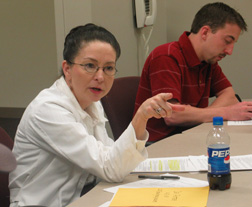
“Most of the younger people in Geneva were driving up to York to receive their care, so most of our patients were older,” Dr. Potter said. “I just had a blast. I just loved the people.”
Dr. Potter’s love of the geriatric population hasn’t worn off, and is evidenced in her passion for teaching, research and outreach related to geriatrics, her colleagues say. Dr. Potter, chief of the UNMC Section of Geriatrics and Gerontology and the Neumann M. & Mildred E. Harris Geriatric Professor, is being recognized with the 2004 Outstanding Teaching Award, presented by the Faculty Senate.
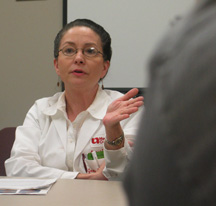
“Dr. Potter’s easy rapport and thorough knowledge of the geriatric landscape provides many students with an excellent advisor,” wrote Edward Vandenberg, M.D., assistant professor of geriatrics and gerontology, in his nomination of Dr. Potter for the award. “So often I have seen students in her office, sharing a cup of tea, receiving both geriatric training and long-term career advice in her typically pleasant and congenial atmosphere. … Highly important to her at all times is attention to attitudes toward the geriatric population, for which she lives, breathes and models.”
Dr. Potter now leads a large group of academic physicians in geriatrics, but it wasn’t always that way. When she was hired in 1982, very little on geriatrics education was included in the medical curriculum. Under Dr. Potter’s leadership, that has changed. The integrating of the curriculum received a boost in 2000 with a grant from the AAMC and an even bigger boost in 2001, when the Donald W. Reynolds Foundation awarded UNMC a $2 million grant to strengthen physician training in geriatrics in the state.
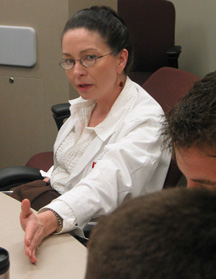
“Under the AAMC grant, we worked with many other departments so that geriatrics was further integrated with the basic science and clinical curriculum,” Dr. Potter said. She credited Gerald Moore, M.D., the associate dean for curriculum in the College of Medicine, for his work in the process.
Traditionally, Dr. Potter said, medical students have seen geriatric patients only at their sickest or most disabled. The integrated curriculum has provided opportunities for students to see the patients during regular check-ups, at nursing homes and at the patients’ homes.
“We try to reinforce what many of them already know, and that is that a lot of folks are well, financially independent and having a good time,” Dr. Potter said. “It’s a different world to see people in their own environment.”
Magnifying the importance of education in geriatrics is the growing geriatric population, Dr. Potter said. As baby boomers reach retirement age, the demand for physicians trained in geriatrics increases. To earn a certification in geriatrics, physicians complete a one- or two-year fellowship and then pass a certificating examination. UNMC’s fellowship program falls under the Department of Internal Medicine, but some physicians who have specialized in family medicine also become certified in geriatrics.
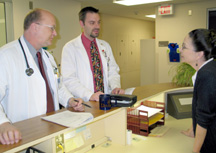
“Both locally and nationally, there’s no way we’ll ever have the number of certified geriatric specialists to meet the need for geriatric care,” Dr. Potter said. “That’s why it’s so important for all physicians to have quality geriatric training.”
While Dr. Potter has made many contributions on campus and regionally, she may be better know nationally for her work in the field. She is the reviewer of several journals, and serves on the Geriatric Test Writing Committee for the American Board of Internal Medicine. She also has been actively involved in many national projects for the American Geriatrics Society (AGS). She currently is a member of the AGS Board of Directors and has been appointed to the Board’s Executive Committee, effective May 2004.
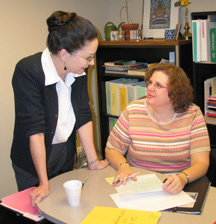
Still, Dr. Potter finds some of her greatest enjoyment while teaching UNMC students, residents and fellows. She said many students probably come away from the sessions thinking, “Boy, she really likes what she does.”
“The health care problems of later life are fascinating, and being able to work with older patients is very rewarding,” Dr. Potter said. “I think it’s important to show my enthusiasm to the students.”